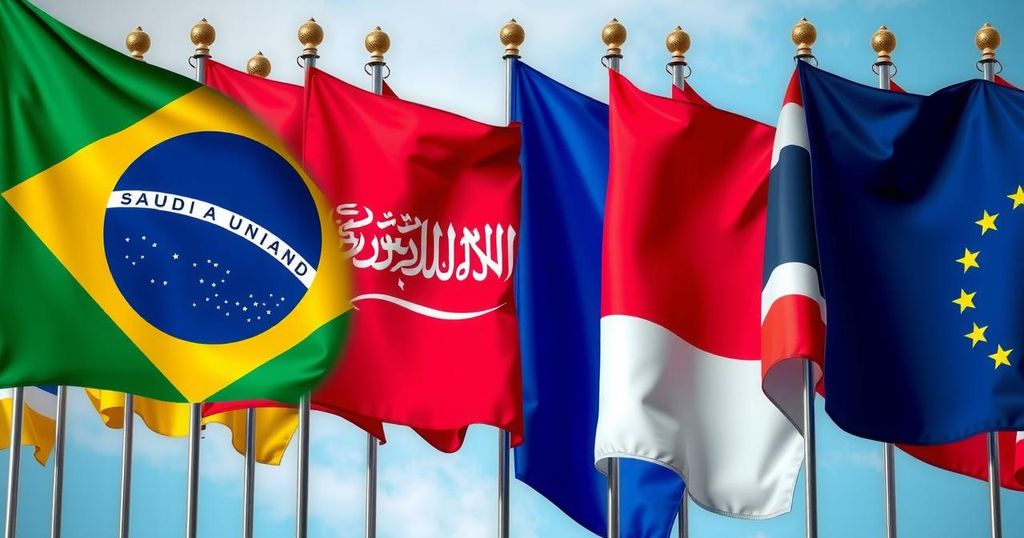Politics
AG, ARMENIA, ASIA, BELARUS, BRAZIL, COLOMBIA, DATA ANALYSIS, EEU, EMPLOYEE BENEFITS, EURASIAN ECONOMIC UNION, EURASIAN UNION, EUROPE, EUROPE/ASIA, EXPORTS, GOOGLE, GOV. BR, GOVB. BR, GOVERNMENT, INTERNATIONAL TRADE, KYRGYZSTAN, MAPA, MINISTERIO DA AGRICULTURA E PECUARIA, MINISTÉRIO DA AGRICULTURA E PECUÁRIA, MINISTÉRIO DAS RELAÇÕES EXTERIORES, MINISTERIO DAS RELACOES EXTERIORES, MINISTRY OF AGRICULTURE AND LIVESTOCK, MINISTRY OF FOREIGN AFFAIRS, MRE, NOT, RUSSIA, SOUTH AMERICA, SUPPLY CHAIN, TRADE
Sophia Klein
Expanding Agricultural Export Opportunities for Brazil in Global Markets
The Brazilian government announces authorized exports of agricultural products to the Eurasian Economic Union, Saudi Arabia, and Thailand, significantly expanding its market reach. This includes exports of bananas, walnuts, yerba mate, macadamia nuts, fishmeal, and fish oil. These efforts reflect a commitment to diversification and strengthening international trade ties, resulting in numerous new business opportunities for Brazilian agribusiness.
The Brazilian government has made significant strides in expanding its agricultural exports, having recently secured approval from several nations for the export of new products. The Eurasian Economic Union (EEU), encompassing Armenia, Belarus, Kazakhstan, Kyrgyzstan, and Russia, has authorized the export of bananas and walnuts, while Brazil’s agricultural exports to the EEU surpassed USD 1.3 billion this year. Additionally, Saudi Arabia has granted permission for Brazil to export yerba mate and macadamia nuts, with Brazilian agricultural exports to the Saudi market exceeding USD 2.3 billion in 2024. Furthermore, Thailand has approved the export of fishmeal and fish oil from Brazil, which are crucial for various industries. Between January and November 2024, Thailand imported over USD 2.7 billion worth of agricultural products from Brazil.
These developments are indicative of the Brazilian government’s commitment to diversifying its agricultural export portfolio and strengthening international trade relations. The successful negotiations underscore the confidence that foreign markets have in Brazil’s agricultural standards and controls. As a result of these efforts, Brazilian agribusiness is poised to capitalize on 221 new market openings by 2024, marking a total of 299 new opportunities since January 2023. This achievement is attributed to the collaboration between the Ministry of Agriculture and Livestock and the Ministry of Foreign Affairs.
Brazil’s agricultural sector has been a crucial driver of the nation’s economy, and the government is actively seeking to enhance its presence in international markets. By negotiating access to new markets, Brazil aims to not only increase its export revenues but also promote its agricultural products globally. The recent approvals from the EEU, Saudi Arabia, and Thailand represent a focused strategy to diversify export destinations and products, which is essential for sustaining agribusiness growth. The trust shown by these nations in Brazil’s phytosanitary measures further highlights the effectiveness of Brazil’s agricultural policies. Such initiatives are vital as they contribute to the overall resilience of Brazil’s agricultural economy in the face of global market fluctuations.
The recent market openings for Brazilian agricultural products in the Eurasian Economic Union, Saudi Arabia, and Thailand illustrate the Brazilian government’s strategic efforts to expand its international agricultural exports. These developments not only enhance Brazil’s export volume but also signify a growing international trust in its agricultural standards. The collaboration between government ministries has yielded a significant number of new market openings, paving the way for increased opportunities in the agribusiness sector.
Original Source: www.gov.br








Post Comment